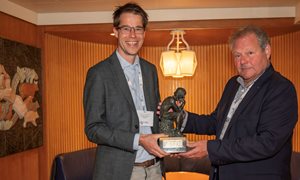11 February 2019
During pregnancy, local uterine natural killer (NK) cells play an important regulatory role by ensuring correct placentation and successful pregnancy. It is known that pregnancy complications of poor placentation are at increased risk in first pregnancies. Since it has become clear that NK cells possess immune memory, it has been suggested that pregnancy could induce memory in uterine NK cells.
The researchers report that previous pregnancy indeed induces an increase of endometrial NK cells with a memory phenotype (LILRB1+ expression on NKG2C+ NK cells) but only when women had a CMV positive status. Multigravidae women with a CMV negative status did not show memory-like NK cells in their endometrium. This suggests that CMV seropositivity might be a prerequisite for the induction of these pregnancy-induced memory endometrial NK cells.
These finding opens up the exciting hypothesis that CMV primes the induction of pregnancy trained eNK cells. This prompts further research to determine how this CMV priming works and whether the observed changes would alter NK cell function in a manner beneficial for future gestations.
 Dorien Feyaerts, from the research group of Van der Molen, theme Inflammatory diseases, showed that pregnancy induces a memory phenotype on endometrial natural killer cells. However, previous CMV infection is a prerequisite for this memory induction.
Dorien Feyaerts, from the research group of Van der Molen, theme Inflammatory diseases, showed that pregnancy induces a memory phenotype on endometrial natural killer cells. However, previous CMV infection is a prerequisite for this memory induction.
During pregnancy, local uterine natural killer (NK) cells play an important regulatory role by ensuring correct placentation and successful pregnancy. It is known that pregnancy complications of poor placentation are at increased risk in first pregnancies. Since it has become clear that NK cells possess immune memory, it has been suggested that pregnancy could induce memory in uterine NK cells.
The researchers report that previous pregnancy indeed induces an increase of endometrial NK cells with a memory phenotype (LILRB1+ expression on NKG2C+ NK cells) but only when women had a CMV positive status. Multigravidae women with a CMV negative status did not show memory-like NK cells in their endometrium. This suggests that CMV seropositivity might be a prerequisite for the induction of these pregnancy-induced memory endometrial NK cells.
These finding opens up the exciting hypothesis that CMV primes the induction of pregnancy trained eNK cells. This prompts further research to determine how this CMV priming works and whether the observed changes would alter NK cell function in a manner beneficial for future gestations.
Related news items

Dutch Society of Clinical Chemistry Science & Innovation Award for the team of Hans Jacobs
14 June 2022 The team of Hans Jacobs pioneers on the development of personalized diagnostics to measure minimal residual disease in patients with multiple myeloma. go to page
Joyce Aarts and colleagues published in Scientific Reports about the role of TGF-β1 in (experimental) arthritis
30 March 2022Joyce Aarts, theme Inflammatory diseases, and her colleagues published in Scientific Reports, that local inhibition of TGF-β1 signaling improves Th17/Treg balance but not joint pathology during experimental arthritis.
go to page
New EU Research project ImmUniverse
27 February 2020 In this project (31 mEURO), RIMLS and RIHS researchers collaborate with 25 European partners on dissecting common disease mechanisms of Ulcerative Colitis and Atopic Dermatitis. go to page
Researchers investigate how stem cells affect the immune system
18 February 2020 RIMLS researchers Irma Joosten and Renate van der Molen, participating in an European study into the treatment of brain damage in premature babies. Is it possible to limit or even partly repair the damage with stem cells? They focus primarily on the effect of those stem cells on the immune system. go to page
It is raining Horizon 2020 grants for RIMLS researchers
15 August 2019 Horizon 2020 is the biggest EU Research and Innovation programme ever with nearly €80 billion of funding available and running from 2014 to 2020. This summer, no less than 8 proposals for the Radboudumc have been accepted, 4 of them even as a coordinator. go to page
